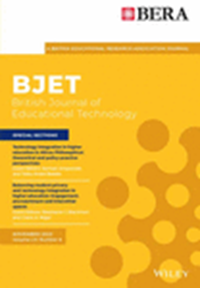在混合式体育教育中培养学生创造性解决问题的策略
IF 6.7
1区 教育学
Q1 EDUCATION & EDUCATIONAL RESEARCH
引用次数: 0
摘要
要想在体育比赛中获胜,除了过硬的运动技能外,面对各种比赛情况的应对策略也是成功的关键。因此,培养学生多样化、创造性和灵活的战术应用能力是体育训练的重要教学目标。然而,在体育混合式培训的网络部分,传统的教学方法是以教师为中心,几乎没有采用其他领域所使用的创造性解决问题的综合方法。这导致学生发现问题和运用创造性思维解决问题的机会有限。因此,本研究建议在混合式培训的在线阶段采用综合的创造性问题解决方法,以培养学生的高阶思维能力。为了验证这种方法的有效性,本研究采用了基于便利分组的准实验设计。在一门台球培训课程中进行了为期 10 周的教学实验。本研究共招募了 79 名学生,将他们分为一个有 41 名学生的 CPS-BL 组和一个有 38 名学生的传统混合式学习(C-BL)组。结果表明,CPS-BL 方法能显著提高学生的台球击球策略、创造性思维倾向和解决问题的能力。在许多运动项目中,如台球,仅有身体技能通常是不够的,还需要高阶思维技能才能取得成功。在大学台球课程中进行了一项实验,以评估所建议的方法的影响。该方法提高了学生的台球击球策略、解决问题的技能和创造性思维。对实践和/或政策的启示 基于创造性问题解决的混合式学习在促进学生的问题解决能力和创造性思维方面具有巨大潜力。本文章由计算机程序翻译,如有差异,请以英文原文为准。
Developing students' creative problem‐solving strategies in the context of blended sports education
To win in sports competitions, in addition to excellent sports skills, coping strategies in the face of various competition situations are also critical for success. Therefore, cultivating students' diverse, creative and flexible tactical application abilities is an important educational goal in sports training. However, in the online component of blended training in sports, conventional instructional approaches are teacher‐centred and hardly ever adopt the consolidated approaches to creative problem solving used in other fields. This results in limited opportunities for students to discover the problems and apply their creative thinking tendencies for problem solving. Hence, the present study proposed applying a consolidated creative problem‐solving approach in the online phase of blended training initiatives in order to cultivate students' higher‐order thinking skills. To verify the effectiveness of this approach, a convenience grouping‐based quasi‐experiment design was adopted. A 10‐week teaching experiment was conducted in a billiards training course. A total of 79 students were recruited in this study; they were divided into one CPS‐BL group with 41 students and one conventional blended learning (C‐BL) group with 38 students. The results showed that the CPS‐BL approach could significantly enhance students' billiards striking strategies, creative thinking tendencies and problem‐solving skills.
In many sports, like billiards, physical skills are generally not enough; higher‐order thinking skills are also needed to succeed.
Blended learning in these sports generally entails teacher‐centred approaches in the online component and practice in the f2f component. This provides students with limited opportunities to develop their creative problem‐solving skills.
There are consolidated methods to develop students' strategic skills though creative problem solving, but these are seldom applied in sports.
The application of a creative problem‐solving approach to physical education is proposed.
An experiment was conducted in a university billiards course to evaluate the impacts of the proposed approach.
The approach enhanced students' billiards striking strategies, problem‐solving skills and creative thinking. Implications for practice and/or policy of creative problem‐solving‐based blended learning has great potential for promoting students' problem‐solving skills and creative thinking.
Creative problem solving‐based blended learning has great potential for promoting students' problem‐solving skills and creative thinking.
The findings of this study provide a reference for future endeavours in designing blended physical learning.
求助全文
通过发布文献求助,成功后即可免费获取论文全文。
去求助
来源期刊

British Journal of Educational Technology
EDUCATION & EDUCATIONAL RESEARCH-
CiteScore
15.60
自引率
4.50%
发文量
111
期刊介绍:
BJET is a primary source for academics and professionals in the fields of digital educational and training technology throughout the world. The Journal is published by Wiley on behalf of The British Educational Research Association (BERA). It publishes theoretical perspectives, methodological developments and high quality empirical research that demonstrate whether and how applications of instructional/educational technology systems, networks, tools and resources lead to improvements in formal and non-formal education at all levels, from early years through to higher, technical and vocational education, professional development and corporate training.
 求助内容:
求助内容: 应助结果提醒方式:
应助结果提醒方式:


